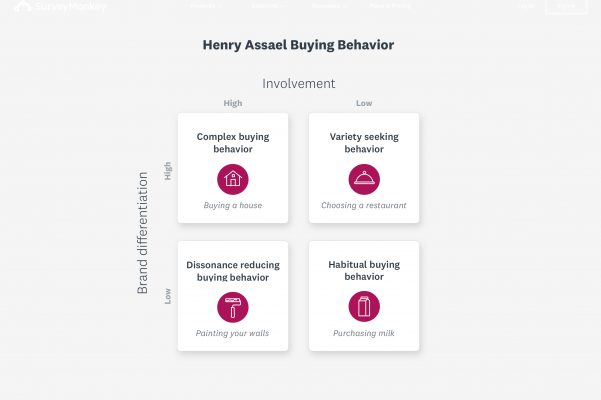Consumer behavior: How to understand buying behavior
Even with mountains of customer data at your fingertips, it’s sometimes hard to pinpoint exactly what motivates consumers to purchase your product, buy it again, or recommend it to friends. By diving into consumer behavior at each step in the customer journey, you can build better marketing campaigns that convince more leads and help retain more loyal customers.
What is consumer behavior?
Consumer behavior is the way people choose and use your products and services. It’s a holistic marketing concept that refers to how people behave throughout the entire lifecycle of your product—from discovery to purchase, use, and disposal. It encompasses patterns of:
- Purchase behavior, such as when a person shops and how they pay for their purchase
- Product usage, such as how often the customer uses your product and if they’re satisfied with their purchase
- Product disposal, such as how long a customer holds onto your product and whether or not they resell it when they’re done
A consumer behavior study looks at the complex cocktail of thoughts, feelings, and habits that drive key decisions in the customer journey—like making an initial purchase, repurchasing a favorite product, or leaving an online review. It answers “why” and “how” people buy and use your product.
What influences consumer behavior?
While rational considerations like price, convenience, and quality drive consumer behavior, so do emotions, desires, and habits. In fact, irrational drivers often have a more potent effect. Personal beliefs and preferences, along with social influences, environmental stimuli, and marketing messages, all influence how consumers respond to a product.
In psychological terms, consumer responses can be either:
- Mental (or “cognitive”), such as deciding to purchase a bigger car for a growing family
- Emotional (or “affective”), such as going to the mall for retail therapy after a tough day
- Habitual (or “conative”), such as always reaching for the same brand of cereal at the supermarket
Every person has a “black box” of mental, emotional, and behavioral factors that affect their buying behavior. The makeup of each person’s black box depends on their personal values, lifestyle, relationships, consumption habits, brand loyalties, demographics, and personality.
Why consumer behavior is important
When your business understands what drives key consumer decisions, including purchase decisions, it can better position your products to appeal to your target population. In the long run, consumer behavior can also affect product development, as information about which features consumers prefer and how they use your product can also be applied to product design.
The insights from a consumer behavior study can help your business make decisions like:
- How to position your product in the market, based on what consumers think and feel about your product compared to competitors’
- Where to advertise and sell your product, based on the ways your target population researches and shops for products
- How to make the decision to purchase your product easier for consumers by catering to their instincts, impulses, and habits
- When to seek reviews and referrals, based on how people use your product after purchase
By studying consumer behavior, you can get a better understanding of what drives purchase decisions, customer retention, and brand loyalty in your target populations. Once you’ve identified patterns of consumer behavior, you can predict how your target market will respond to marketing campaigns and new product launches before they happen.
Of course, some parts of your target market might respond differently to different stimuli, based on their individual thoughts and feelings. The results of a consumer behavior study might reveal important behavioral segments in your target population, like online vs. in-person shoppers, impulse vs. need-based buyers, and loyal vs. non-loyal customers. These behavioral segments can help you develop and deliver targeted marketing messages.

Types of consumer behavior
Even if consumers fall into specific behavioral segments, they don’t make every purchase decision in the same way. Each purchase comes with its own set of financial, physical, social, and psychological risks—and the same person will act differently based on the weight of the decision at hand.
Complex buying behavior
When consumers consider making an expensive, infrequent purchase, they typically express complex buying behavior. This type of consumer behavior is characterized by exhaustive product research and high involvement in the purchase process. If a person is looking to buy a house, for example, they’re probably going to research a bunch of locations and visit all their options in-person before making an offer on a property.
Consumer behavior vs. customer behavior
While you can uncover useful customer behavior metrics in, for example, the data collected by your customer management system, these metrics don’t tell the whole story. A customer behavior study can give you partial insight into buying behavior, such as customer preferences, frequency of use, and repurchase behavior, but it has limited applicability for marketers.
A consumer behavior study takes a more holistic approach to buying behavior by examining the way it manifests across the entire product lifecycle, including before people become customers. Because consumer behavior includes the entire target population, it’s more useful for marketers.
How to get consumer behavior data
Consumer behavior includes the experiences of people who might buy your product, people who actually buy your product, and people who use your product even though they didn’t buy it themselves (for example, a household member or employee of a customer).
Market research and customer satisfaction surveys help you get a complete picture of the buying behavior of everyone in your target population.
Market research surveys uncover the value drivers that influence people’s purchase decisions. This type of survey is an opportunity to delve deeper into the pain points, needs, and wants of your target population, so you know how and why people might choose your product.
More specifically, a consumer behavior survey identifies the rational and irrational drivers behind the respondent’s product decisions. It asks questions like, “Do you typically make decisions about which brand you’ll buy beforehand or at the time of purchase?” and “How many other people in your household use this product category?”
Looking to customize your approach? Get tips to uncover unique value drivers with surveys.
Aim your consumer behavior survey at people from your target population, regardless of whether or not they already know about your product. SurveyMonkey Audience can help you reach a representative sample of your target market, so you can be confident in the accuracy of your results.
Customer satisfaction surveys help you collect both qualitative and quantitative data on your customers’ behavior after they’ve purchased your product. The results of this type of survey expand your picture of consumer behavior by exploring how customers use and dispose of your product.
A product feedback survey is often the best way to discover how customers interact with your product. This survey explores issues of product use with questions like “What are the things you’d most like to improve about the product?” and delves into disposal with questions about whether or not the product would be a good gift.
Keep in mind, the person who purchases a product isn’t always the one who ends up using it. To reach as many end users as possible, you may want to embed your survey in your product software rather than emailing it to the buyer. Think about including your survey as a pop-up in the product troubleshooting section of your website or somewhere else people who use your product will be.
While you can deep dive into consumer behavior by running both market research and customer satisfaction surveys, you don’t need to conduct an exhaustive study to get useful insights. A single survey is all you need to shed light on consumer behavior.
Better marketing with consumer behavior insights
By delving into consumer behavior, businesses can make sense of customer data and build marketing campaigns that hit on the practical and emotional reasons people buy your products. Here are a few ways to use your consumer behavior insights to build better marketing campaigns.
- Emphasize the product benefits that your target population wants most (and your customers like most). For example, if your target market expresses brand-conscious behavior, you might focus on advertising campaigns that emphasize your brand identity more than the product itself.
- Time your marketing campaigns so they reach consumers when they typically buy—for example, during the holidays, on weekends, or when they use up an existing product. To discover which times and days work best, use a combination of customer metrics and survey results.
- Target messages for specific behavioral segments. The marketing message that motivates an impulse buy won’t be the same one that motivates a quality-conscious purchase. Adjust your message to suit different behavioral segments, or to suit fluid consumer behaviors brought on by environmental stimuli (like making an impulse buy while waiting in line at a check out). To help overwhelmed consumers work through dissonance reducing buying behavior and make a purchase, consider putting together detailed marketing materials that compare products and brands.
Discover more resources

適合您職位的解決方案
SurveyMonkey 可協助您更有效地完成工作。探索如何藉由制定成功策略、產品、體驗等來發揮更大影響力。

Hornblower 改善了全球客戶體驗
探索 Hornblower 如何使用 SurveyMonkey 和功能強大的 AI 來充分利用 NPS 資料、收集客戶見解並改善客戶體驗。

2025 年不能不知道的 AI 行銷統計數據
88% 的行銷人員每天工作都會使用 AI。想知道行銷人員在 2025 年會如何使用 AI 嗎?瞭解如何在這波浪潮中保持優勢。

品牌追蹤調查問卷範本
使用我們的品牌追蹤調查問卷範本改善您的品牌健全度。透過專家推薦的正確問題來提問,以有效評估您的品牌資產。
Want to dive deeper into data-driven marketing practices?
Discover the full range of marketing solutions from SurveyMonkey.